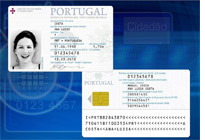

 Public Services
Public Services  Projects
Projects  The Citizen's Card
The Citizen's Card The Citizen's Card
The Citizen’s Card is a citizen’s electronic identification document which substitutes the traditional Identity Card and other identification cards. This project was started during 2005, with the aim of making it available to citizens from the end of 2006.

The operational aspects of the project were overseen by Knowledge Society Agency (UMIC) and coordination within the scope of the administrative modernisation of the State was organised by the Coordination Unit for Administrative Modernisation (UCMA) (site in Portuguese).
The Citizen’s Card is a citizen’s electronic identification document which substitutes the traditional Identity Card and other identification cards. The project was started during 2005, with the aim of making it available to citizens from the end of 2006. The operational aspects of the project were overseen by Knowledge Society Agency (UMIC) and coordination within the scope of the administrative modernisation of the State was organised by the Coordination Unit for Administrative Modernisation (UCMA)(site in Portuguese) .
From the physical point of view, it has a smart card format and replaces the existing Identification Document, Tax Payer’s Card, Social Security Card, Voter’s Card and National Health Service card.
From the visual point of view, the front contains a photograph and civil identification items. On the back, there are the identification numbers for the five cards which are joined together and substituted, an optical reader area and an electronic contact circuit.
From the electronic point of view, it has an electronic contact circuit, with the same information on the physical card being registered electronically, including photo and fingerprint biometrics, and electronic signatures.
 It is an identification document exclusively, and does not contain any data from the Public Administration services which can be accessed.
It is an identification document exclusively, and does not contain any data from the Public Administration services which can be accessed.
It ensures compatibility with the new electronic identification documents which are being adopted by the European Union and increases security, with additional features which make it difficult to falsify or steal it as well as have access to the citizen’s personal data.
As an electronic identity card, it enables electronic identification by IT services and the authentication of electronic documents through adding electronic signatures. In this way the citizen is able to interact with different public and private services, independently of the place where they are located. In particular, through the Internet it enables use of an electronic access point to Public Administration services without the need to physically go to offices and be limited by their opening hours. It also allows identity to be confirmed when being attended to in a multichannel manner, namely in-person, via the Internet or by telephone (with one-time passwords produced using the card).
The Citizen’s Card project in turn forms part of the scientific and technological development project, enabling:
- Improvement in access to public services, reducing barriers and diversifying means of access, at a lower cost;
- Integration of services through providing means and resources which facilitate the sharing of data and information; applications integration; interoperability between systems and cooperation between entities;
- Simplification of administrative procedures and processes, by adapting them to the requirements of the functionality, efficiency and speed of new technologies;
- Satisfying the citizen’s needs, by supplying information in an understandable and useful manner, and eliminating bureaucratic obstacles and barriers to the provision of quality public services;
- Prudent database management ensuring trustworthiness and security, with regard to the rights, freedoms and guarantees of citizens.
The Citizen’s Card project will enable Portugal to be part of the group of the first countries within the European Union to make an electronic identification card available which will substitute the traditional national identification document and be one of the countries with more dematerialised services making use of this type of card.
This project forms one of several Public Administration initiatives within the scope of electronic identification, namely:
- The Portuguese Electronic Passport has been available since 28 August 2006. Work related to this started later than envisaged, in the second quarter of 2005, but it was possible for Portugal to make up time and to become the 11th country within the European Union to issue electronic passports;
- The State's Electronic Certification Program was set up on 16 June 2006 with work on the programme having started in November 2005, with the aim of ensuring the issuing and management of electronic signatures within the Public Administration, to ensure the functioning of its own PKI (Public Key Infrastructure) which, besides other applications, will enable complete dematerialisation of the legislative process.
Knowledge Society Agency (UMIC) liaised with the Portuguese Electronic Passport project regarding the requirements for the equipment collecting biometric data, specifically relating to photography, fingerprint and height, in order to ensure compatibility with the requirements for the Citizen’s Card. These projects led to the Portuguese manufacturing industry producing a new machine to obtain biometric data, in a process coordinated by the Innovation Agency - AdI (site in Portuguese) using the scientific and technological support of the Institute for Systems and Robotics - Lisbon (ISRLisboa). UMIC formed part of the working group which in November 2005 was encharged with the preparations for the setting up of the State's Electronic Certification Body and as well as the Managing Council of this entity.
The complexity of the Citizen’s Project required the holding of a Proof of Concept, which was coordinated by UMIC and by UCMA, to try out ideas and solutions and analyse the impacts and necessary transformations within the public bodies involved. Projects and solutions developed within the scope of this from other countries were studied, the requirements of the Citizen's Card were rigorously specified and any necessary concrete items were obtained to enable project specification.
The Citizen's Card was initially issued in a pilot phase on the island of Faial, in the Azores, on 14 February 2007 and it was planned that, after it being made generally available in the Azores, it would gradually be made available in the rest of the country from June 2007 onwards.
At the end of April 2007 1,595 Citizen’s Cards had been issued, with 683 containing an active electronic signature, and there had been 1,904 requests for the Card. After this, the pilot phase to make the Citizen’s Card available, which had started on the island of Faial, was extended to the islands of Pico, Flores and Corvo in the Azores, and made available to another 19 thousand citizens through 14 service points.
Responsibility for the Citizen’s Card project was moved from UMIC to the Agency for Administrative Modernisation - AMA (site in Portuguese), on 1 May 2007, following the start of activities by this new body, to which was transferred the competencies which UMIC had held in the field of electronic public administration, following the publication of the organic law and the statutes of the AMA (site in Portuguese) in the Official Gazette Diário da República, on the 27 and 30 April 2007, respectively, with continuity ensured by the transfer of the member of the UMIC Management Board responsible for electronic public administration projects to become the Director of AMA (site in Portuguese).
However, as a matter of practicality UMIC continued to look after the operational component carried out for the Citizen’s Card project until the end of 2007.
As of 5 July the Citizen’s Card started to be issued throughout the Azores in the nine islands, at a total of 27 service points, by which time 3,629 cards had been issued, 1,502 with an active electronic signature.
On 31 July 2007, the Citizen’s Card began being issued within mainland Portugal, starting with Castelo de Vide, in Portalegre, by which time 6,789 cards had been issued, 40% with an active electronic signature.
On 31 October 2007, applications for Citizen’s Cards could be made in the registry offices of Vila Flor, in Bragança, and Mourão, in Évora, by which time 12,375 cards had been issued.
On 14 February 2008, a year after the launch of the Citizen’s Card in its pilot phase, around 26,500 cards had already been issued, 50% of which with active electronic signatures, with more than 100 service points where the card could be requested, namely in the Azores and the districts of Portalegre, Évora, Bragança and Beja. It was foreseen that by the end of June 2008 the project would encompass the whole country with service points for Citizen’s Card applications.
By17 March 2008 42,270 cards had been issued and there were 126 public service points where applications for the card could be made. At the end of July 2008, 144 thousand Citizen's Cards, and applications for the card could be made at 248 public service points.
More detailed information on the Citizen’s Card is available at http://www.cartaodecidadao.pt/.
